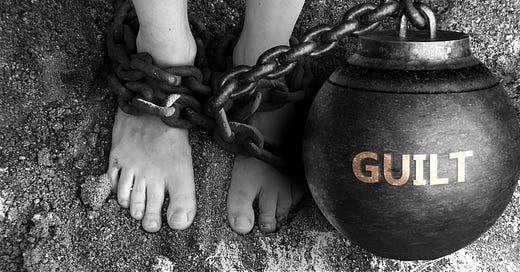Long ago, in my thirties, I lived in New York City and like all New York girls, had a tiny apartment. One day I was complaining to Jim, my shrink, that my mom was coming to town and, although I was looking forward to seeing her, I wasn't looking forward to having her stay with me on the couch in my cramped walk-up.
"Why don't you ask her to stay at a hotel?" Jim asked.
"Oh no, I couldn't possibly do that," I was shocked he would even suggest it. “The thought of it throws me into a panic. I just feel too guilty."
"Why don't you try following your guilt?" Jim suggested. He explained that if something made me feel guilty, the guilt was a sure sign I should do it. "It may seem paradoxical," he said, "but trust me, it works."
Jim was brilliant and insightful and could be counted upon to come up with new ways to look at old problems. I’d learned not to discount his insights.
I'd been talking to him recently about the Joseph Campbell series on PBS, especially the part where Campbell said the path to happiness is “following your bliss.” I’d told Jim I wished I could follow my bliss but I had no idea what my bliss was.
“It’s impossible for the truly guilt-ridden among us to follow our bliss,” Jim explained, “because we feel too guilty about it, so following our guilt is the next best thing.”
I laughed. How could I take that advice seriously?
The reason "follow your guilt" works, Jim explained, is that for women who are afflicted with neurotic guilt, i.e. most women sitting in shrinks’ offices, feelings of guilt point the way to our deepest desires, the very things that we most want to do but were prohibited from doing by parents or other authority figures. And it's those very actions that are most important to our development as mature adults.
Healthy guilt is when you have done something wrong and your conscience is bothered. The kind of guilt society fosters in women, however, is neurotic and unproductive. Although "follow your guilt" isn't applicable to everyone—sociopaths and pathological narcissists can stop reading now — for the ordinary, neurotic, guilt-ridden, people-pleasing female, following your guilt is powerful medicine!
It took some convincing but finally I called mom, took a deep breath, and suggested that maybe it would be a good idea if she stayed at a hotel. After a hurt silence and a few recriminations, she did just that--and we had one of the best times together we'd had in years.
"Our society teaches women to cultivate guilt like a flower garden," said psychotherapist and author, Harriet Lerner, who I interviewed about the subject "There's no way a woman can win when it comes to guilt. Women feel guilty about leaving their children for their work and guilty about leaving their work for their children. They feel guilty if they don't have children--or if they don't work. They feel guilty about feeling guilty, and guilty about the prospect of not feeling guilt.”
If you feel rotten about yourself, guilt is the real culprit, Jim explained. "The reason guilt is so insidious is that it feels like incapacity. It feels like you can't succeed, because you don't have the talent, intelligence, or social connections. Or you can't find a mate because you're too ugly, too shy, too whatever. But when you come right down to it you don't feel entitled. Whatever you most desire is forbidden fruit, something you shouldn't have."
Getting over the guilt is the hard part. "You really have to take responsibility for whatever you're doing with your life,” Jim advised. “You need to see that you don't feel entitled to getting what you want--that the very feeling of being entitled isn't part of you, but instead feels strange and foreign. If you can let yourself experience that sensation of a stranger inside who represents you better than yourself, it will give you a visceral clue about the real problem"
I left therapy with Jim a long time ago, but I kept his words in mind for the rest of my life. The times I followed my guilt led to my best decisions. I moved to Florida although I felt guilty leaving my estranged adopted daughter. Maybe she’d come around. She didn’t, but I got to move on from a crippling family situation. I said no to writing for clients I couldn’t stand even though I felt guilty about ditching them, and felt a huge burden had been lifted. I recently felt guilty about not returning the calls of a depressed, pitiful woman who wanted to be my friend. I realized I couldn’t rescue her and didn’t want to. And on and on.
Rachel Hare-Mustin, a feminist family therapist nailed it, "Show me a woman who doesn't feel guilt and I'll show you a man."




